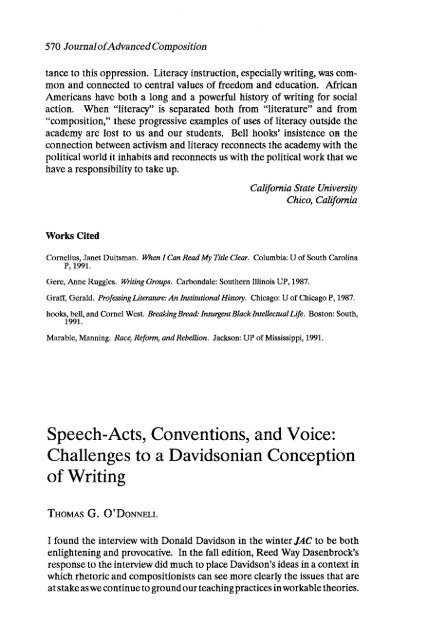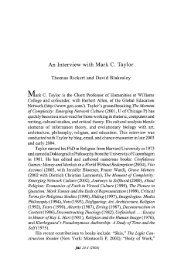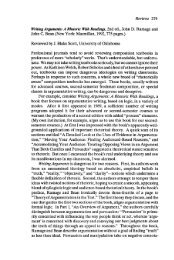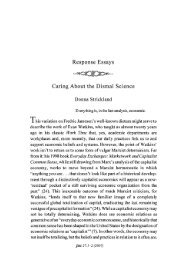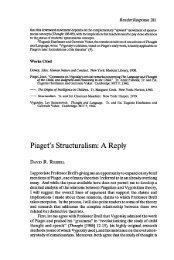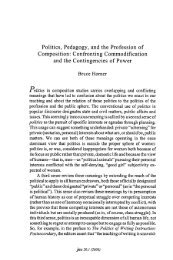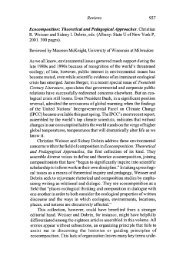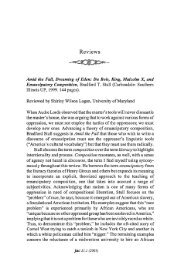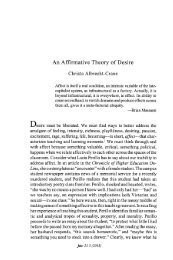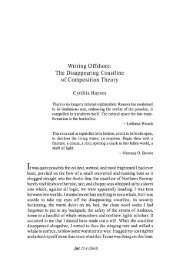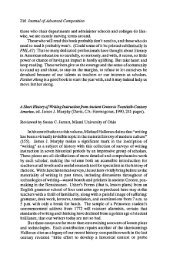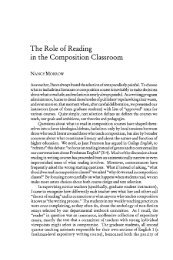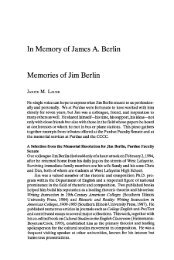Speech-Acts, Conventions, and Voice: Challenges to a ... - JAC Online
Speech-Acts, Conventions, and Voice: Challenges to a ... - JAC Online
Speech-Acts, Conventions, and Voice: Challenges to a ... - JAC Online
You also want an ePaper? Increase the reach of your titles
YUMPU automatically turns print PDFs into web optimized ePapers that Google loves.
570 Journal ofAdvanced Composition<br />
tance <strong>to</strong> this oppression. Literacyinstruction, especially writing, was common<br />
<strong>and</strong> connected <strong>to</strong> central values of freedom <strong>and</strong> education. African<br />
Americans have both a long <strong>and</strong> a powerful his<strong>to</strong>ry of writing for social<br />
action. When "literacy" is separated both from "literature" <strong>and</strong> from<br />
"composition," these progressive examples of uses of literacy outside the<br />
academy are lost <strong>to</strong> us <strong>and</strong> our students. Bell hooks' insistence OR the<br />
connection between activism <strong>and</strong> literacy reconnects the academy with the<br />
political world it inhabits <strong>and</strong> reconnects us with the political work that we<br />
have a responsibility <strong>to</strong> take up.<br />
CaliforniaState University<br />
Chico,California<br />
Works Cited<br />
Cornelius, Janet Duitsman. WhenI CanReadMy TitleClear. Columbia: U of South Carolina<br />
P,1991.<br />
Gere, Anne Ruggles. WritingGroups. Carbondale: Southern Illinois UP, 1987.<br />
Graff, Gerald. ProfessingLiterature:An InstitutionalHis<strong>to</strong>ry. Chicago: U of Chicago P, 1987.<br />
hooks, bell, <strong>and</strong> Cornel West. BreakingBread:InsurgentBlackIntellectualLife. Bos<strong>to</strong>n: South,<br />
1991.<br />
Marable, Manning. Race,Reform,<strong>and</strong> Rebellion. Jackson: UP of Mississippi, 1991.<br />
<strong>Speech</strong>-<strong>Acts</strong>, <strong>Conventions</strong>, <strong>and</strong> <strong>Voice</strong>:<br />
<strong>Challenges</strong> <strong>to</strong> a Davidsonian Conception<br />
of Writing<br />
THOMAS<br />
G. O'DONNELL<br />
I found the interview with Donald Davidson in the winter lAC <strong>to</strong> be both<br />
enlightening <strong>and</strong> provocative. In the fall edition, Reed Way Dasenbrock's<br />
response <strong>to</strong> the interview did much <strong>to</strong> place Davidson's ideas in a context in<br />
which rhe<strong>to</strong>ric <strong>and</strong> compositionists can see more clearly the issues that are<br />
at stake aswe continue <strong>to</strong> ground our teaching practices inworkable theories.
Reader Response 571<br />
There are two issues Iwant <strong>to</strong> address in this response: the first has <strong>to</strong> do with<br />
Dasenbrock's dismissal of speech-act theory as relevant <strong>to</strong> the teaching of<br />
composition; the second is an observation about conventions which I hope<br />
will lead <strong>to</strong> a more refined <strong>and</strong> instructive Davidsonian approach <strong>to</strong> the<br />
teaching of writing.<br />
Although speech-act theory has proven <strong>to</strong> be useful in various fields,<br />
Dasenbrock calls attention <strong>to</strong> its limitations in the composition classroom:<br />
"Classic speech act theory postulates 'uptake' or a full underst<strong>and</strong>ing of the<br />
'conversational implicature' as essential <strong>to</strong> communication. That seems<br />
much less easy <strong>to</strong> posit as a norm for writing than for conversation" (524). If<br />
we hope <strong>to</strong> import elements of speech-act theory in<strong>to</strong> the composition<br />
classroom, Dasenbrock's observation must be acknowledged. The value of<br />
speech-act theory, however, can be much broader than Dasenbrock is allowing,<br />
<strong>and</strong> its pedagogical significance does not depend on a congruence<br />
between speech-acts <strong>and</strong> writing-acts; indeed, my claims rest on the assumption<br />
that compositionists can do more <strong>to</strong>ward enriching students' underst<strong>and</strong>ings<br />
ofwhat language does <strong>and</strong> how it does it by focusing on issues that<br />
are not textual but still have bearing on considerations that will ultimately<br />
become textual: how we conceive of language broadly-theoretically-will<br />
inevitably impact specific uses of language.<br />
I think many of us involved in the teaching of writing work from the<br />
hidden assumption that students come <strong>to</strong>' us devoid of any theoretical<br />
positions regarding language <strong>and</strong> communication whatsoever. We sometimes<br />
view them as tabula rasas in this area, despite the fact that they have<br />
spent many years using language for various purposes. In myexperience, the<br />
predominant theory that guides students in their workings with language is<br />
some variation of representationalism: words (re)present preexisting ideas<br />
that are simply named or labeled by words as needed. When speaking of<br />
"theory" in this context, I do not mean <strong>to</strong> suggest that students come <strong>to</strong> us<br />
with a full-blown <strong>and</strong> coherent theory of language or meaning. On the<br />
contrary, the fact that they don't is what poses a problem; students (<strong>and</strong><br />
people generally) construct theories expediently,astheyare needed (Davidson<br />
calls these "passing theories"), but the specific "needs" that crop up can also<br />
lend spurious credence <strong>to</strong> various forms of representationalism.<br />
The danger of representationalism lies in its tendency <strong>to</strong> diminish the<br />
importance (<strong>and</strong> obligation) of being self-conscious about language use, <strong>and</strong><br />
this includes both speaking <strong>and</strong> writing. If ideas are simply "out there," <strong>and</strong><br />
language serves only <strong>to</strong> transfer these already-in-place concepts, the value of<br />
studying language, practicing writing, <strong>and</strong> engaging in classroom discussions<br />
about meaning is dubious since these activities deal only with the packaging<br />
of concepts, not with concepts themselves. Discussions focusing on language<br />
<strong>and</strong> words (meaning, diction, style, voice) can be <strong>to</strong>o easily dismissed as<br />
"semantics" (in a pejorative sense)-one step removed from life <strong>and</strong> all that<br />
really matters.
572 JournalofAdvanced Composition<br />
I have come <strong>to</strong> believe that some form of representationalism underwrites<br />
what I can only describe as a kind of magical thinking in which<br />
intention isimbued with an unquestioned status <strong>and</strong> power while the hazards<br />
of actual language use are suppressed. Such positions tend <strong>to</strong> manifest<br />
themselves in classroom discussions which involve interpretation, most<br />
often, in workshop settings. Several semesters ago, my students <strong>and</strong> I were<br />
participating in a workshop, <strong>and</strong> one of the papers we were going over<br />
included the term "bitchy." 1was provoked by this word <strong>and</strong> curious as <strong>to</strong> its<br />
sexist implications; as far as I knew (<strong>and</strong> know), the word is reserved<br />
exclusivelyfor women, <strong>and</strong> I could not think of an adequate synonym used <strong>to</strong><br />
describe male character. We spent some time trying <strong>to</strong> ground the term <strong>and</strong><br />
its possible meanings, <strong>and</strong> after four or fivestudents had offered interpretations,<br />
one of my students, in a state of mild exasperation, concluded: "bitchy<br />
can mean whatever you want it <strong>to</strong> mean."<br />
My student's claim hardly constitutes a theory of meaning, but it has<br />
relevance as a passing theory; that is, the theory was invoked <strong>to</strong> cope with a<br />
particular speech occasion, one in which an acceptable stabilization of<br />
meaning was clearly impossible given the diverse interpretations offered. A<br />
more general rendering of this theory might be something like, "words can<br />
mean whatever you want them <strong>to</strong> mean." The making of meaning conceived<br />
of in terms of reading an audience <strong>and</strong> consulting conventional meanings is<br />
replaced by a trust in wants, wishes, <strong>and</strong> intentions. Mystudent <strong>to</strong>ok refuge<br />
in the reassuring position that intention will somehow burn through the<br />
obfuscations, ambiguities, <strong>and</strong> interpretive difficulties that alwayssurround<br />
language use. This position is grounded in representationalism <strong>to</strong> the extent<br />
that it assumes an inordinate cleavage between word <strong>and</strong> concept. Words<br />
only "st<strong>and</strong> for" ideas: if you want <strong>to</strong> communicate something in using the<br />
word bitchy, <strong>and</strong> you are also aware of the interpretive difficulties posed by<br />
the word, an appealing recourse is <strong>to</strong> take refuge in what you want <strong>to</strong> mean.<br />
<strong>Speech</strong>-act theory provides a useful way <strong>to</strong> approach representationalism<br />
<strong>and</strong> its variants-any theory that regards language as acollection ofwords<br />
that name independently existing concepts. In How To Do Things With<br />
Words,J.L.Austin works through hisnowclassicdistinction between constative<br />
<strong>and</strong> performative utterances: simply put, constative utterances describe a<br />
state of affairs; performative utterances actually do something; they perform<br />
an action. "1saw him mowing his lawn yesterday," is a constative utterance;<br />
"I promise <strong>to</strong> take you <strong>to</strong> the hockey game," is a performative: the utterance<br />
is coincidental with the establishing of a contract.<br />
Austin introduced the distinction between constatives <strong>and</strong> performatives<br />
<strong>to</strong> clarify philosophical muddles endemic <strong>to</strong> assessments of meaning that<br />
dwelled on whether a statement is true of false. Constative utterances are<br />
subject <strong>to</strong> such evaluations; performatives are not. The most fundamental<br />
accomplishment of Austin's distinction is that it forces a broadening of our<br />
underst<strong>and</strong>ing of what language does, what we do when we use words in
Reader Response 573<br />
various situations. In the writing classroom, introducing performative<br />
utterances leads students <strong>to</strong> consider aspects of language that are clearly<br />
incompatible with anystrain 0 frepresentationalism. When someone says, "I<br />
forgive you," the utterance is not a statement of fact but an action. When you<br />
say,"I apologize," it is difficult <strong>to</strong> conceive of analyzing the "meaning" of this<br />
sentence by speculating on a specific concept it represents or transports.<br />
When language overtly performs an action, questions of meaning become<br />
more clearly questions of use.<br />
I do not mean <strong>to</strong> suggest that introducing students <strong>to</strong> performative<br />
utterances will somehow lead them <strong>to</strong> a sophisticated theory of meaning, but<br />
in more optimistic moments, I hope that my students, in having <strong>to</strong> account<br />
for the performative utterances instrumental in their own daily activities, are<br />
inspired <strong>to</strong> see language <strong>and</strong> meaning more in terms of self-conscious<br />
employment <strong>and</strong> less in terms of wanting or wishing a word <strong>to</strong> mean a<br />
preexisting idea. I hope, that is, that the claim "bitchycan mean whatever you<br />
want it <strong>to</strong> mean," will be recast in<strong>to</strong> a more valuable passing theory: "bitchy<br />
can mean various things <strong>to</strong> various people, so assess your audience <strong>and</strong> the<br />
likelihood that your meaning (intention) will be clear <strong>to</strong> them." This may be<br />
a formidable task, but posing the problem in this way involves students in an<br />
inquiry in<strong>to</strong> the meaning making process that does not rely on the assumption<br />
that meaning is entirely a function of wanting <strong>to</strong> mean something or<br />
meaning <strong>to</strong> mean something.<br />
<strong>Voice</strong>, <strong>Conventions</strong>, <strong>and</strong> Meaning<br />
My second point is intended <strong>to</strong> encourage <strong>and</strong> further discussions about<br />
conventions-what they are (or might be), <strong>and</strong> their usefulness in the<br />
teaching of writing. It is unfortunate, I believe, that Austin's legacy is most<br />
visible in references <strong>to</strong> How To Do Things With Words <strong>and</strong> the constative/<br />
performative distinction. Discussions of Austin's work become less productive<br />
the more they assume that Austin was proposing or assuming a theory of<br />
language; as Stanley Cavell remarks, the work "does not for Austin yield a<br />
theory of language; on the contrary, he takes this work <strong>to</strong> show how far we are<br />
from anything he would regard as a serious theory of language" (Themes 35).<br />
Although the constative/performative distinction is valuable (with notable<br />
limitations), Austin's more striking insights occur when he is engaged<br />
in painstakingly working out subtle distinctions of ordinary language, as he<br />
does, for example, in "A Plea For Excuses." Following the essay along as<br />
Austin refines distinctions between <strong>and</strong> among "excuses," "justifications,"<br />
"mistakes," "accidents," "inadvertence," "unintentional," <strong>and</strong> so on, I feel<br />
tha t I'm rediscovering or relearning the waysin which we explain, excuse, <strong>and</strong><br />
justify human action. Cavell characterizes Austin's procedures <strong>and</strong> their<br />
effects in this way:<br />
The positive purpose in Austin's distinctions resembles the art critic's purpose in<br />
comparing <strong>and</strong> distinguishing works of art, namely, that in the crosslight the capacities
574 Journal of Advanced Composition<br />
<strong>and</strong> salience of an individual object in question are brought <strong>to</strong> attention <strong>and</strong> focus....<br />
In Austin's h<strong>and</strong>s, I am suggesting, other words, compared <strong>and</strong> distinguished, tell what<br />
a given word is about. To know why they do, <strong>to</strong> trace how these procedures function,<br />
would be <strong>to</strong> see something of what it is he wishes words <strong>to</strong> teach, <strong>and</strong> hints at an<br />
explanation for our feeling ... that what we learn will not be new empirical facts about<br />
the world, <strong>and</strong> yet illuminating facts about the world. (Must We 103-04)<br />
The power of Austin's work lies in what Cavell calls the discovery of<br />
"illuminating facts about the world," but I am particularly interested in how<br />
such work, such procedures <strong>and</strong> their results, may challenge what we mean<br />
when we speak of conventions, especially when we speak of them in terms of<br />
their significance <strong>and</strong> application in the teaching of writing. At one point in<br />
his response <strong>to</strong> Davidson's interview, Dasenbrock posits a particular relationship<br />
between voice <strong>and</strong> conventions: "We attain our own voice, a<br />
Davidsonian approach <strong>to</strong> usage suggests, not by slavishly following nor by<br />
desperately avoiding received conventions, but by playing off against them.<br />
The more radical our departure from received conventions, the more we risk<br />
unintelligibility; but the more we respect <strong>and</strong> follow received usage, the more<br />
we risk boredom" (525). As Dasenbrock casts the problem, the chief task<br />
involved in cultivating a personalized voice is navigating between unintelligibility<br />
<strong>and</strong> boredom, but Austin's work suggests <strong>to</strong> me alternatives <strong>to</strong> this<br />
characterization. His most challenging <strong>and</strong> illuminating work involves the<br />
exposureof conventions, but I would hardly describe the results of his<br />
enterprise as boring. I am not suggesting that Austin's philosophical voice<br />
fails <strong>to</strong> challenge conventions; indeed, one of his trademarks as a philosopher<br />
is his routine employment of striking <strong>and</strong> original examples, a skill that<br />
distinguishes his philosophizing. Those of us who find Austin's work<br />
uniquely clarifying, however, would not likely attribute this power <strong>to</strong> the<br />
thwarting of the conventions of philosophical discourse but <strong>to</strong> specific<br />
Austinian demonstrations which remind us of the forgotten power of conventions<br />
<strong>to</strong> demarcate conceptual boundaries with as<strong>to</strong>unding precision. It<br />
is usually when hidden capacities of conventional usage are brought <strong>to</strong> light<br />
that questions surrounding conventions become both more urgent <strong>and</strong> more<br />
difficult. What are conventions? How can we characterize our investment<br />
in them? <strong>Conventions</strong> are often characterized as arbitrary, mere collective<br />
choices, but Cavell takes issue with Stanley Fish on this matter <strong>and</strong> exposes<br />
the limitations of explaining conventions in terms of agreements:<br />
But Fish's words here make this agreement seem much more, let me say, sheerly<br />
conventional than would seem plausible ifone were considering other regions ofAustin's<br />
work, for example, the region of excuses,where the differences, for one small instance,<br />
between doing something mistakenly, accidentally, heedlessly, carelessly, inadvertently,<br />
au<strong>to</strong>matically, thoughtlessly, inconsiderately, <strong>and</strong> so on are worked out with unanticipated<br />
clarity <strong>and</strong> completeness but where the more convinced you are by the results, the<br />
less you will feel like attributing them <strong>to</strong> agreements that are expressible as decisions.<br />
How could we have agreed <strong>to</strong> consequences of our words that we are forever in the<br />
process of unearthing, consequences that with each tum seem further <strong>to</strong> unearth the<br />
world? (I don't say there is no way). (Themes 40)
Reader Response 575<br />
The problem may be that Austin is revealing something, but we don't quite<br />
know how <strong>to</strong> characterize these revelations; in displaying conventions in the<br />
ways he does, are we <strong>to</strong> view them as agreements, shared meanings, or some<br />
kind of elusive solidarity, something akin <strong>to</strong> what Wittgenstein calls "forms<br />
of life?" Whatever the answer may be, it is clear that work such as Austin's<br />
urges us <strong>to</strong> clarify what we can meaningfully convey by "conventions," since<br />
they must be something more (or something more difficult <strong>to</strong> explain) than<br />
mere agreements.<br />
Part of my difficulty with Dasenbrock's notion of "voice" as something<br />
<strong>to</strong> be struck by negotiating between unintelligibility <strong>and</strong> boredom may have<br />
<strong>to</strong> do with the incongruity which characterizes the options: is one's voice<br />
likely <strong>to</strong> be less boring the more it approaches unintelligibility? Is intelligibility<br />
the aspect of writing (or language use in general) that is most at risk in<br />
efforts <strong>to</strong> circumvent boredom? To what extent does risking boredom <strong>and</strong><br />
following received usage assure intelligibility?<br />
The question of intelligibility generates questions of meaning, <strong>and</strong><br />
conventions are certainly an issue here, especially if we characterize them as<br />
established ways of making meaning; it seems more difficult, or a different<br />
kind of task al<strong>to</strong>gether, <strong>to</strong> specify what is at stake, what is missing, what is<br />
present, when a voice "bores." Although I find myself willing <strong>to</strong> evaluate<br />
voice in terms of its reliance on or deviation from accepted conventions, I<br />
think it unlikely that avoicewhich does nothing <strong>to</strong> challenge conventions will<br />
necessarily be boring. Whether or not a voice is "boring" or "engaging" (I do<br />
not think there is an exact antithesis) strikes me as a different question<br />
al<strong>to</strong>gether ,one that willinvoIveme in the act 0 fcriticism, the results of which<br />
mayor may not include an indictment (or praise) of conventions.<br />
Seeing the cultivation of voice in terms of pushing the envelope of<br />
conventional usage seems <strong>to</strong> me <strong>to</strong> be a misrepresentation of the issue <strong>and</strong><br />
one that fails <strong>to</strong> account for the surprises of learning that often accompany<br />
encounters with the conventional, <strong>and</strong> these surprises are not limited <strong>to</strong><br />
those with philosophical training. Indeed, my suggestions here grow out of<br />
a larger conviction that conventions themselves can serve as the very source<br />
of a philosophically-oriented rhe<strong>to</strong>ric. A semester ago, a student of mine<br />
wrote an essay in which he analyzed the various ways <strong>and</strong> contexts in which<br />
he employs the verb <strong>to</strong> know. Among his discoveries was the realization that<br />
the grammar of knowing (grammar in the Wittgensteinian sense of the word)<br />
is multifaceted. The most striking example my student used was a scene in<br />
which his mother <strong>to</strong>ld him, "you've got <strong>to</strong> clean up your room." His response<br />
was, "I know," but he went on <strong>to</strong> explain in his essay that in claiming <strong>to</strong><br />
"know," he did not communicate <strong>to</strong> his mother an acknowledgment of the<br />
fact that his room was untidy, nor did he intend <strong>to</strong>; "I know," in the context<br />
in which he used it, meant something more akin <strong>to</strong> "leave me alone," or "I'll<br />
take care of it later." This is a case in which a conventional expression-a<br />
claim of knowledge-is used for a specific, context-bound rhe<strong>to</strong>rical effect. I
576 Journal ofAdvanced Composition<br />
see my student's efforts at working through these different uses of "I<br />
know"-his inclination <strong>to</strong> talk about the use of a word in terms of intention,<br />
grammar, <strong>and</strong> consequence-as the beginnings of a way of thinking about<br />
language that is philosophical, <strong>and</strong> I believe such discoveries are just as<br />
valuable <strong>to</strong> students as learning about the ways in which conventions constrain<br />
voice.<br />
In mapping out the applications of Davidson's ideas for teachers of<br />
writing, Dasenbrock writes, "In emphasizing the mutability of our prior<br />
underst<strong>and</strong>ing, Davidson establishes creativity <strong>and</strong> innovation at the very<br />
heart of communication" (525). I close with two questions: first, "prior<br />
underst<strong>and</strong>ing" of what, exactly? Second, do "creativity <strong>and</strong> innovation"<br />
necessarily m<strong>and</strong>ate a challenge <strong>to</strong> conventions? My reading of Austin's<br />
work <strong>and</strong> Cavell's characterization of its results, <strong>and</strong> myconviction that the<br />
study of conventions (their limits <strong>and</strong> peculiar powers) is valuable <strong>and</strong><br />
inherently philosophical, suggest that creativity <strong>and</strong> innovation can just as<br />
often be a case of calling <strong>to</strong> mind (being reminded of) the depth <strong>to</strong> which <strong>and</strong><br />
the particular ways in which conventions determine what we say <strong>and</strong> mean<br />
<strong>and</strong> what we can say <strong>and</strong> mean.<br />
FloridaState University<br />
Tallahassee,Florida<br />
Works Cited<br />
Cavell, Stanley. Must WeMean Mat WeSay. Cambridge: Cambridge UP, 1969. 97-114.<br />
-. ThemesOut of School:Effects<strong>and</strong> Causes. Chicago: U of Chicago P, 1984. 27-59.<br />
Dasenbrock, Reed Way. "A Response <strong>to</strong> 'Language Philosophy, Writing <strong>and</strong> Reading: A<br />
Conversation with Donald Davidson." JournalofAdvanced Composition 13 (1993): 523<br />
28.<br />
A Reply <strong>to</strong> Thomas G. O'Donnell<br />
REED WAY DASENBROCK<br />
The situation of responding <strong>to</strong> a response <strong>to</strong> one's own response <strong>to</strong> an<br />
interview is sufficiently dialogic that it seems we ought <strong>to</strong> be discussing<br />
Bakhtin or Gadamer rather than Davidson, Austin <strong>and</strong> Cavell,not that these<br />
are utterly incompatible thinkers. But I appreciate the care <strong>and</strong> openness <strong>to</strong><br />
dialogue apparent in Thomas O'Donnell's response, <strong>and</strong> I welcome the<br />
opportunity <strong>to</strong> clarify <strong>and</strong> extend my thoughts on the two central points he<br />
makes.


